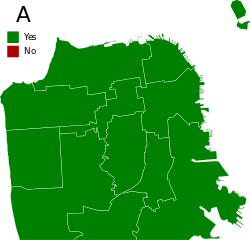The November 2009 San Francisco general elections were held on November 3, 2009, in San Francisco, California. The elections included those for San Francisco city attorney and treasurer, and five ballot measures. [1]
Contents
- City attorney
- Treasurer
- Propositions
- Proposition A
- Proposition B
- Proposition C
- Proposition D
- Proposition E
- References
- External links
The most contentious ballot measure, Proposition D, was a proposal to allow billboard advertisements on part of Market Street. [2] San Francisco voters rejected the measure. [2]





